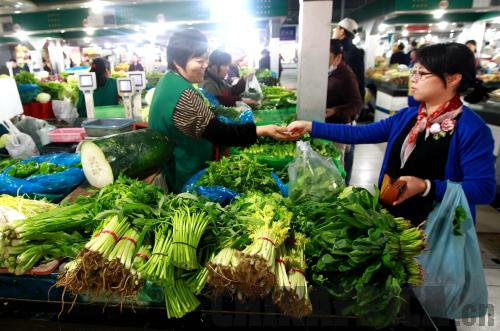|
 |
|
BITTER FRUIT: Increased wages hikes up food prices and (below) promotes unnecessary luxury spending (XINHUA) |
Migrant worker Su Ruifang has lived in Beijing for more than 10 years. She started out as a cleaner, but has since gained skills and now works as a sought-after confinement nurse enjoying a monthly income increase from 600 yuan ($95) to 5,000 yuan ($793).
Many Chinese couples plan to have a baby in 2012, the Year of Dragon, as they believe babies born in this year will lead a propitious life. As a result, the demand for confinement nurses like Su is on the rise.
"I am in for an income boost because many expectant mothers even made a reservation [for my services] six months in advance," she said, adding, "White-collar workers only make an average of 3,000 yuan ($476) per month in my hometown city of Dalian."
Raising standards
Su is among the working class who feel their wages have increased substantially in recent years because of the government's efforts.
According to the data released by the Ministry of Human Resources and Social Security, by the end of September last year, a total of 21 local governments had adjusted their minimum wage standards, with an average increase of 21.7 percent year-on-year.
The southern manufacturing city of Shenzhen had the highest minimum wage at 1,500 yuan ($238) per month and Beijing had the highest minimum hourly wage at 13 yuan ($2).
The per-capita income of urban residents rose 8.4 percent, after deducting inflation, to 21,810 yuan ($3,461) in 2011 from a year earlier, said the National Bureau of Statistics (NBS). Urban residents' wage income grew 12.4 percent. Meanwhile, the per-capita income of rural residents grew by 11.4 percent year-on-year to 6,977 yuan ($1,107), faster than the previous year, and their wage income grew 21.9 percent.
The increase in income is followed by a further rise in consumption. China's retail sales rose 14.7 percent year-on-year to 3.37 trillion yuan ($533.8 billion) in the first two months of this year, NBS announced.
Xu Shanda, former Deputy Administrator of the State Administration of Taxation, believes increased income is key to the growth of consumption. Domestic consumption will become a more important source of economic growth in the next five-year period and beyond than it was in the past.
|